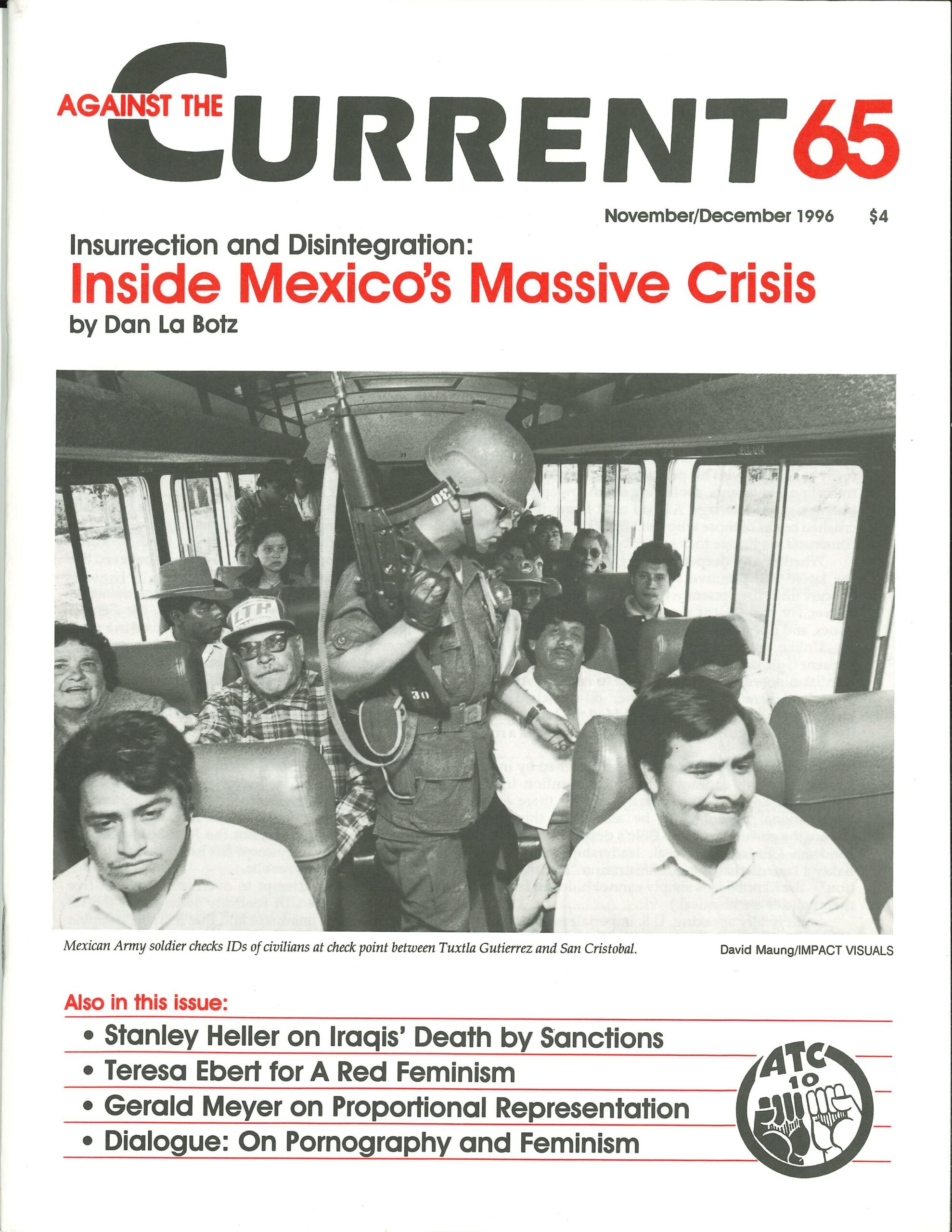Against the Current, No. 65, November/December 1996
-
The Gulf Slaughter Revisited
— The Editors -
The Poisoned Fruits of Oslo (II)
— The Editors -
For Iraqi Children, Death by Sanctions
— Stanley Heller -
The Vulnerable Are 70% of the Population
— interview with Professor Peter Pellett -
Jerusalem's Inevitable Explosion
— David Finkel -
The Strike at McDonnell Douglas
— Peter Downs -
HMOs, A Pox on Our Houses
— Pauline Furth, M.D. -
Toward 21st Century Democracy
— an interview with Steven Hill -
Proportional Representation: The Urgency of Real Reform
— Gerald Meyer -
Can Repression Save Indonesia's Suharto?
— Dianne Feeley -
Congratulations!
— The Editors -
Mexico: Insurrection and Disintegration
— Dan La Botz -
Towards A Red Feminism
— Teresa Ebert -
The Rebel Girl: The Transgendered Outlaw
— Catherine Sameh -
Detroit Newspaper Strike Update
— The Editors -
Random Shots: Notes from a Smoker's Diary
— R.F. Kampfer - Viewpoints on the "Stand for Children"
-
Standing for Children, or Clinton?
— Susan Dorazio -
Standing for All Our Children
— Sasha Roberts - Reviews
-
Marxism and the Fate of the European Jews
— Peter Drucker - Dialogue
-
A Response to Cathy Crosson
— Anne E. Menasche -
A Rejoinder
— Cathy Crosson -
On the Trotskyist Opposition
— Paul Le Blanc -
A Rejoinder
— John Marot - In Memoriam
-
Michel Mill 1944-1996
— Patrick M. Quinn -
In Memory of Constance Coiner
— Alan Wald -
Friend, Scholar and Fighter
— James Petras -
In Memory of Steve Zeluck
— Lew Friedman -
Steve Zeluck: Revolutionary Marxist
— Charlie Post
Alan Wald
CONSTANCE COINER, A 48-year-old Associate Professor of English at SUNY Binghampton, and her 12-year-old daughter, Ana, were among the passengers killed on the TWA flight that exploded after departing New York City for Paris in late July. They were mentioned in a report on National Public Radio, in a New York Times article titled “A Scholar’s Reward,” and in The Chronicle of Higher Education.
Constance had been sympathetic to Workers Power (one of the groups that fused to create Solidarity in the mid-1980s) in Los Angeles, and had recently contributed a review of the book Labor and Desire by Paula Rabinowitz to the July-August 1994 issue of Against the Current.
The July-August 1996 issue of ATC carries a review of Constance’s own new book, Better Red, a study of left-wing fiction writers Tillie Olsen and Meridel Le Sueur.
Constance was a well-known activist in socialist-feminist and multicultural literary/academic circles in the late 1980s and 1990s. Even before she received her Ph. D. from UCLA, she was deeply involved with the journal Radical Teacher, and its sponsoring organization, the Radical Caucus of the Modern Languages Association. Constance frequently chaired the caucus-sponsored sessions at national conventions of MLA.
Constance wrote book reviews and essays for In These Times, Women’s Review of Books, and elsewhere. She also contributed the entry on class for The Oxford Companion to Women’s Writing in the U.S., and published a 1987 interview with poet Carolyn Forche, about whom she planned to write a critical study.
Several of Constance’s essays on Olsen and Le Sueur were widely republished. Constance knew both women personally, and named her own daughter for the young female protagonist in Olsen’s novel, Yonondio.
At the time of Constance’s death, she was preparing a collection of essays about parenting in the academy. She was also in the process of writing an introduction to the reprint of Alexander Saxton’s The Great Midland in the “Radical Novel Reconsidered” series that I edit for the University of Illinois Press. Saxton, a former Communist and proletarian novelist of the 1940s and 1950s, became an eminent Historian at UCLA, and author of the scholarly book The Rise and Fall of the White Republic. Constance was one of his students, and she regarded him as a formative influence on her.
Constance was a popular teacher, especially because of her concern with students from working-class backgrounds. She was also a vital and vivid presence in left cultural circles, setting a fine example for politically committed cultural workers of her generation.
ATC 65, November-December 1995

